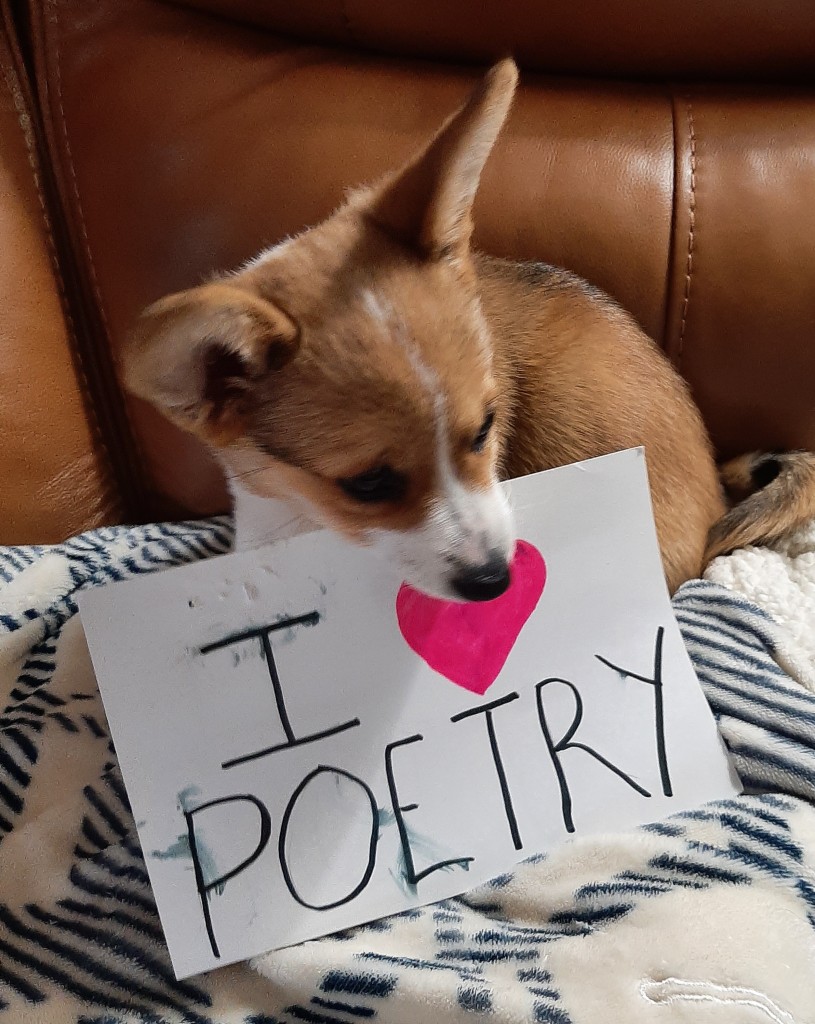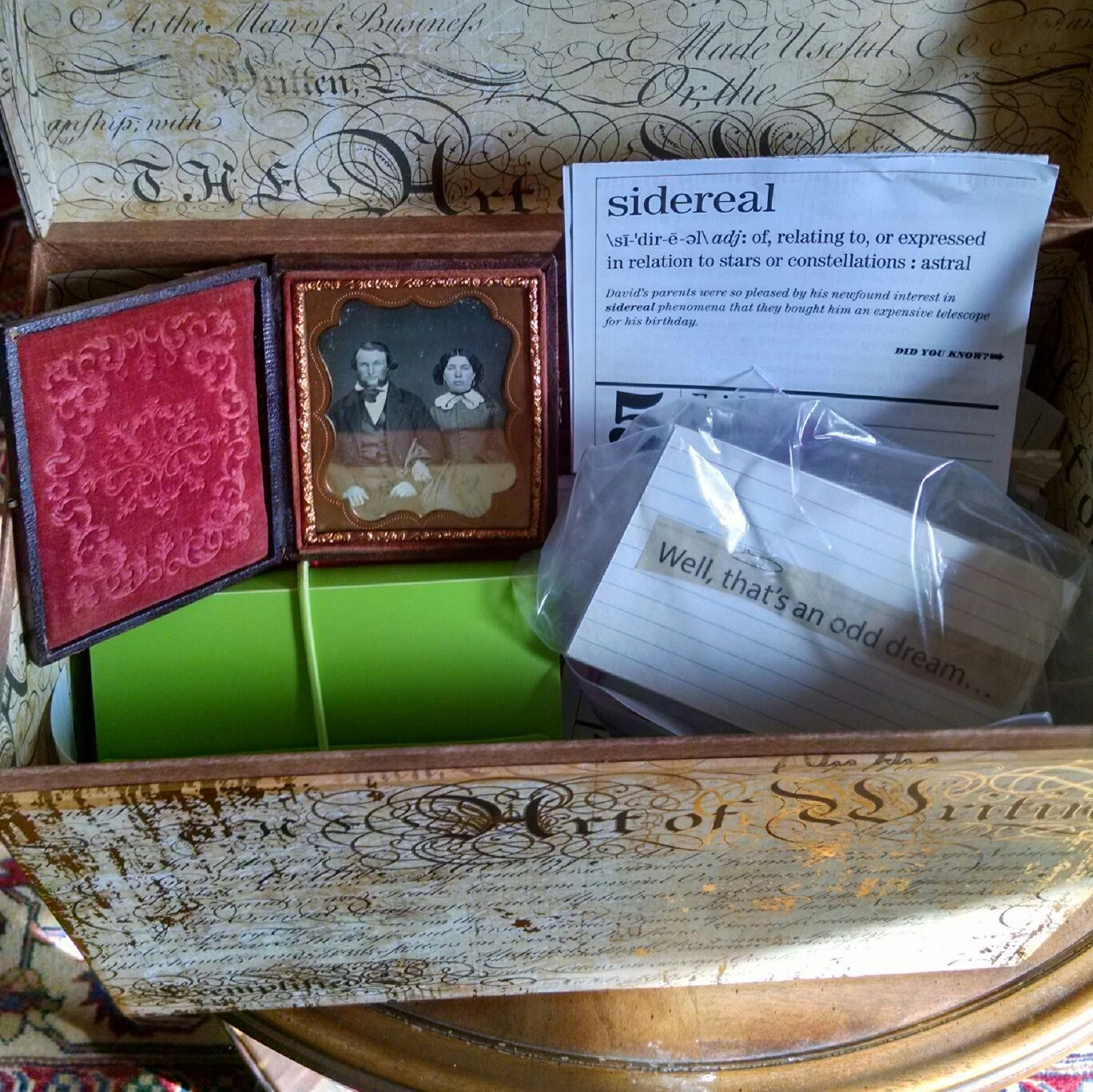In celebration of April being National Poetry Month, I’m republishing a recent column I wrote for Women on Writing, my favorite community of fellow writers.
With cherry blossoms, warmer weather and longer days, April brings so many reasons to celebrate. For me, the season has brought yet another new dog into my life. Along with Max, a Siberian Husky, and Finn, a beagle-terrier mix, we now have Tulsa Rose (Tulsi for short), a twelve-week-old corgi. With three dogs on my hands, I’m especially grateful that April is also the official month of poetry. Between the endless barking, nipping, and wiggling, I need all the sanity I can get.

little baby teeth into poetry!
In a previous WOW column, I wrote about why writers of all genres should consider writing poetry. This time we’re going to discuss why you should read poetry. As I write this, I realize I’m probably preaching to the choir. However, as I’m sure that the poets among us would agree, the pleasures—and value—of reading poetry cannot be overstated.
Six Reasons to Read Poetry
1. Sound. Reading poetry magically slows down the frenetic pace of life and forces us to concentrate on the very building blocks of writing—words. In truth, poetry is about more than words. It’s about syllables and sound. There’s a reason childhood rhymes such as Mother Goose’s “Hickory dickory dock, the mouse ran up the clock…” are so easy on the ears. As adults, we still appreciate rhyme. Who doesn’t relish every single syllable of Sylvia Plath’s famously manic villanelle: Mad Girl’s Love Song? But non-rhyming poetry has its own delights. Who can’t read Poem by William Carlos Williams and not imagine every single step of the cat walking over the jam closet and into the flower pot? Reading poetry is a great reminder of the importance of paying attention to every single syllable.
2. Capture a Moment. Most writers, whether they consider themselves traditional poets or not, possess a poet’s sensibilities. What I love so much about Williams’ poem is the way he preserved forever the elegant stride of his cat in an otherwise awkward situation. When I’m having difficulties on a scene in my own writing, I remind myself to break it down to a single moment, just as Williams did. For example, as my character frets about her new life after a divorce, if I want to convey despair, I will have her observe and reflect on the naked branches of her favorite maple tree in autumn. Conversely, if I want to express hope, I’ll have her ruminate about the nubile leaves of the same tree in spring.
3. Art of Compression. Reading poetry reminds us of the power of brevity. Yard Sale Chair by Robert Cooperman (Rattle #7) tumbles with delightful metaphors that easily transport the reader into a scene that is all-too-familiar but made fresh again. Reading it makes me work a little harder on my own word pictures. Matthew Sweeney’s Five Yellow Roses, another poem I recently discovered, reminds me that the world abounds with little stories. When stumped for new ideas, I simply stop and observe life around me, and as Sweeney did, re-imagine the possible story behind scenes such as a flower delivery.
4. Builds connections. Who doesn’t have the minute or two that it takes to read a poem? The efficiency and sheer accessibility of poetry crosses generations, economics, education levels and more. For example, you don’t have to be a Gen X’er like me to sway to the music at Adult Night at Skate World. (Rattle, February 11, 2023). This lovely poem by Christina Kallery so perfectly recreates the angst of lost love, old friendships and cheesy music of the roller rink that it resonates with readers of all ages. The writers among us can learn from her concise descriptions, clever enjambments, and that unforgettable last line.
5. Fosters empathy. Connections lead to the ultimate goal of any writing—to build understanding and compassion. I challenge you to read Flute in a Far Room by Ruth Moose (Your Daily Poem) without feeling your own twinge of loneliness along with our homesick narrator. And you don’t have to be a dog lover to be moved by the late Jane Kenyon’s After An Illness, Walking the Dog (Poetry Foundation). Reading Kenyon—who, like Moose, elevates the ordinary into the sublime—reminds us that the simplest acts in life are the universal ones.
Ta-da! And now, drum roll please, it’s time for the final reason that you should read poetry. But I’m sure you saw it coming.
6. Improves your writing. Reading poetry is not only fun, it inspires you to be a better writer. For all the reasons previously mentioned and then some. It provides a welcome break from our own work, thus enhancing mental health and happiness. In this sense, poetry is the ultimate “self-care” for writers.
I hope you’ve enjoyed some of the work I’ve shared in this post, and like Tulsi, will soon sink your teeth into your own favorites. As a starting place, take a look at The Ten Best Poems of All Time (compiled by Marie Seeba for The Strand). And if the month of April leads to you to write your own poems, even better.
Wishing you a glorious spring full of writing and inspiration!
 My mother gave me a lovely box many years ago. It’s covered with inspirational writing in a lovely gold script, and it’s become my nesting box for those little snippets of inspiration — favorite new words, quotes, articles, even bits of random conversation I happen to overhear. It also includes old postcards and pictures, like the daguerreotype of a young married couple, circa 1840….
My mother gave me a lovely box many years ago. It’s covered with inspirational writing in a lovely gold script, and it’s become my nesting box for those little snippets of inspiration — favorite new words, quotes, articles, even bits of random conversation I happen to overhear. It also includes old postcards and pictures, like the daguerreotype of a young married couple, circa 1840….